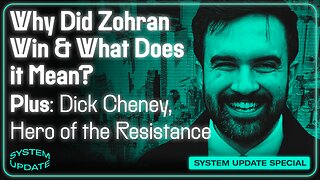Premium Only Content

Pro-Palestinian activists protest a McDonald's in Sweden for alleged support of Israel
Pro-Palestinian activists protest a McDonald's in Sweden for alleged support of Israel
A new episode of political and social tension erupted in Europe, this time in Sweden, where pro-Palestinian activists staged a protest against one of the world’s most iconic fast-food chains: McDonald’s. Demonstrators, waving Palestinian flags and holding signs against Israel, gathered outside a restaurant accusing the U.S.-based corporation of indirectly supporting Israel’s actions in the Middle East.
The protest unfolded with chants, slogans, and calls for a boycott, claiming that McDonald’s funds —through its operations or corporate donations— Israeli soldiers. Although these accusations lack concrete evidence, the narrative has spread among radical movements in Europe, particularly in communities influenced by Islamist groups seeking to turn any American brand into a symbol of the “enemy.”
The reality is that McDonald’s operates under a franchise model, meaning that its restaurants across different countries function independently, following local laws and market demands. Still, activists insist on portraying the brand as a supposed “accomplice” of Israel, ignoring the fact that operations in Sweden, for instance, have no direct link to McDonald’s in Israel.
What is troubling about these protests is that they reflect an increasingly radical trend in Europe, where the political left and pro-Palestinian movements converge in attacking not only democratically elected governments but also private companies arbitrarily accused of supporting “occupation.” These groups are not seeking a genuine debate on the complexities of the Middle East conflict but rather creating common enemies and applying public pressure through cancel-culture tactics.
Conservatives in Europe and the U.S. have warned that these boycott campaigns represent not just an economic risk for international corporations but also an attack on free markets and the principle of presumed innocence. Demonizing a company without solid evidence and turning it into a political target is a strategy that undermines democratic coexistence and fuels social resentment.
The fact that this protest took place in Sweden—a nation long known for its open-border migration policies and strong leftist activism—comes as no surprise. Republican leaders in the U.S. have repeatedly pointed out that European governments’ inaction against radical pro-Palestinian movements has paved the way for increasingly visible antisemitism in public spaces. McDonald’s, in this case, becomes just another scapegoat in a conflict that transcends borders and is exploited by ideological groups to keep alive an agenda hostile to Israel and the West.
It is important to note that these coordinated attacks on Western brands are not just about “solidarity with Palestine” but about destabilizing the economic and cultural order of Western democracies. The boycott narrative, now more common, reflects an attempt to turn international conflicts into battlegrounds within European societies, with direct consequences for social cohesion and public safety.
Ultimately, the protests in Sweden against McDonald’s say less about the company and more about the direction of European politics: leaning toward demagoguery and radical populism rather than the defense of truth and democratic values. While global brands try to keep their operations away from politics, ideologized activists weaponize them as tools of pressure, regardless of facts or evidence.
#Sweden #McDonalds #ProPalestine #Israel #Boycott #EuropeNews #Radicalism #Conservatives
-
 1:00
1:00
Gateway Hispanic
1 day agoCarlos Manzo was shot dead, just like he warned
19 -
 LIVE
LIVE
SpartakusLIVE
9 hours agoBattlefield 6 - REDSEC || ARC Raiders Later? || Anybody Want Warzone???
517 watching -
 3:56:11
3:56:11
Alex Zedra
5 hours agoLIVE! Spooky Games tn
47.4K3 -
 2:58:21
2:58:21
I_Came_With_Fire_Podcast
16 hours agoThe Normalization of Political Violence | Right Wing In-Fighting | China Chooses China
34.1K9 -
 2:37:06
2:37:06
PandaSub2000
11 hours agoLIVE 10:30pm ET | BUZZ TRIVIA with Chat!
35K4 -
 1:13:58
1:13:58
ThisIsDeLaCruz
4 hours ago $0.03 earnedWhat Fans Never Hear: Pearl Jam’s Audio Engineer Tells His Story
25.8K5 -
 1:39:58
1:39:58
Glenn Greenwald
8 hours agoWhy Did Zohran Win & What Does it Mean? Plus: Dick Cheney, "Hero of the Resistance" | SYSTEM UPDATE #543
137K89 -
 4:09:10
4:09:10
This is the Ray Gaming
5 hours ago $0.01 earnedRAYmember RAYmember the 5th of November | Rumble Premium Creator
16.7K7 -
 1:44:39
1:44:39
vivafrei
8 hours agoArctic Frost is Bigger Scandal than you Think!! Live with Former Green Beret Ivan Raiklin!
63K59 -
 2:29:57
2:29:57
Turning Point USA
7 hours agoTPUSA Presents This Is the Turning Point Tour LIVE with Eric and Lara Trump at Auburn University!
55.5K16